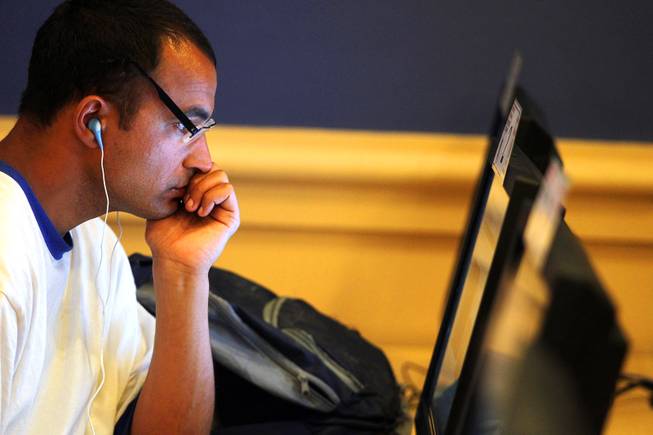
Tarik Madanat of Henderson listens to music at one of the computer stations at Green Valley Library in Henderson on Tuesday, April 10, 2012.
Wednesday, April 11, 2012 | 2 a.m.
Sun coverage
It is National Library Week, and every year at this time the American Library Association releases its State of America’s Libraries report. This year, as has been the case ever since the economy entered a recession, the report highlighted budget cuts and the increasing cost of keeping up with new technology.
“An economy still recovering from the Great Recession and stubbornly high unemployment rates continues to generate increased demand for the free and varied services libraries provide, even as many revenue-challenged state and local governments have considered libraries the low-hanging fruit at budget-cutting time,” the report states. “Even the Institute of Museum and Library Services took a budget hit, and the Library of Congress lost nearly 10 percent of its workforce.”
But the story of libraries today is not all doom and gloom like the conclusion of “Grapes of Wrath.”
Libraries are expanding their programming to become more intertwined with community involvement and activity. Libraries are using social media and new technology to both promote their services at little to no cost and to streamline services and make better use of employee time. The use of self-checkout, e-books and online access of library resources are all increasing.
According to the American Library Association, from fiscal year 2009-2010 to 2010-2011, the number of people who used Nevada public libraries to access the Internet increased 21 percent and overall library visits rose nearly 6 percent.
“One thing that has become evident during the downturn is how many people there are who can’t afford Internet access in their homes,” said Robb Morss, Las Vegas-Clark County Library District deputy director. “We’ve seen our Internet usage and Wi-Fi access points usage increase drastically. ... People are job hunting, communicating with family, all of the things you need computers for now. A lot of employers now want you to submit applications online.”
Providing Internet access is not the only way libraries are staying relevant.
Libraries in the Las Vegas area offer online homework help for students, tax preparation assistance, genealogy research help, child and lifelong learner programs, and access to e-book and e-audio books.
The Las Vegas-Clark County Library District offers a music download service from which library members can download five digital tracks per week for free.
Gwen Alexander, dean of Emporia (Kan.) State University’s School of Library and Information Management, said libraries are adapting to the new ways people consume information and conduct research.
“People are able to do a lot of their own research online with search engines,” Alexander said. “It used to be there was a little information out there and librarians helped you find it. Now, there is tons of information out there and librarians help you sift through and determine what’s relevant. Librarians help people understand information literacy, how to discern if the information online is accurate and if it’s from a responsible provider. ... There’s a lot of junk out there now that people didn’t run into before.”
Marcia Warner, president of the Public Library Association, a division of the American Library Association, said she sees libraries today as undergoing a fundamental shift in how they serve communities.
“We’ve stepped into the gap between the haves and have-nots when it comes to access to technology,” Warner said. “The local and federal governments now expect libraries will be there to fill that gap. The other thing for me is that libraries today are the place to find neutral ground for communities to voice opinions. A lot of legislators are using libraries for town halls. We are a logical choice for such community events because of the intellectual freedom background.”
Libraries all over the country and in Southern Nevada are increasing programming and community involvement. The Henderson library on Green Valley Parkway is offering a Civil War lecture series, has set aside a space for community artwork and poetry, and has a table at the front of the building with copies of most free local publications available in Las Vegas.
“We offer all sorts of classes, including computer courses and a pain-management class, in conjunction with community partners,” said Kevin Scanlon, head of the adult services department at the Green Valley Library. “We offer those classes in English and Spanish. ... We are looking for increased exposure, and in the process we hope to bring more people in. At the same time, it’s getting easier for people to use our services without coming into the library at all, like downloading an e-book.”
E-books and other electronic media are the new frontier for libraries, and libraries and publishers are currently locked in a battle over how to fairly price the materials.
“It’s a whole new world out there,” Morss said of the e-book market, noting that the Las Vegas-Clark County Library District has 30,000 registered users of its e-book program. “From the publisher’s side, they only sell it to you once and it will never be damaged or wear out. From the library side, the question is: What do we do when we are done with a copy? Maybe it’s a hot best-seller and we order more copies at the beginning than we need long-term. You can’t sell those extra copies in a used bookstore.”
The public library systems in Southern Nevada have certainly taken their hits.
The Las Vegas-Clark County Library District’s current $59 million budget, which funds 25 branches, decreased by about 9 percent from the previous year. It has lost 96 staff positions over the past few years due to layoffs, buyouts and the elimination of vacant positions.
The Henderson Library budget, for six branches, peaked at $10 million and is currently at $7 million.
Both library systems have had to reduce hours due to the budget reductions.
“We did see a decrease in circulation and visitors when we had to reduce hours,” Morss said. “In the last two months, though, we’ve seen quite an increase in the use of services. We’ve seen an increase in the use of all items — print materials, DVDs, everything. I’d speculate that part of it has to do with people getting used to the new hours.”


Join the Discussion:
Check this out for a full explanation of our conversion to the LiveFyre commenting system and instructions on how to sign up for an account.
Full comments policy